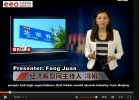

June 27, 2013
Translated by Dou Yiping
A key government official yesterday revealed information about China's plan to promote urbanization including details of how the government would push ahead with reforms to the country's controversial household registration system (户籍制度).
Reforms to the Hukou system, as the household registration system is often referred to, will make it easier for migrant workers to settle in cities by gradually removing obstacles to obtaining a residence permit.
Xu Shaoshi (徐绍史), the head of the National Development and Reform Commission (NDRC), delivered a report on the State Council's efforts to promote urbanization to the third meeting of the NPC Standing Committee on June 26. The report included specific details about what will be included in the yet-to-be released urbanizartion plan.
According to Xu's report, as the pace of urbanization picks up, the government will lift controls over people relocating to smaller cities and gradually loosen the restrictions that apply to rural residents seeking to relocate to medium-sized and larger cities. Very large cities like Beijing, Guangzhou and Shanghai will also draw up new conditions according to which internal migrants can seek permanent residence.
Currently, China's urbanization rate of 52 percent is relatively low compared to other countries. If the level of urbanization were to increase by one percentage point each year, then 70 percent of China's population would be urban dwellers by 2030.
For big cities like Beijing, the pace of intergrating new residents will inevitably be slow. On the one hand, the cost of providing social services like education, health care and insurance for migrant workers is steep, with some scholars estimating that each new urban resident will cost the city 200,000 yuan. On the other hand, an influx of large numbers of people pouring into these very large megacities, raises the question of whether city management can keep up. It's likely going to be a long time before migrants arriving in big cities like Beijing will be able to apply for permanent residence.
Li Tie (李铁), an official with the National Development and Reform Commission (NDRC), said it would be easier to start the reform of China's household registration system with migrants who have a stable job and have been living in the cities with their family for a long time – these people can be relocated in the suburban areas at first.
There is currently a huge disparity in the quality of social services provided to individuals registered in urban and rural areas.
According to a research report produced by the China Center for Urban Development (CCUD), Hukou reform in China is making slow progress due to concerns that an infux of migrants will overwhelm some of country's largest cities and impact on the quality of social services provided to locals.
Data from the CCUD reveals that from 2010 to 2012, a total of 25 million people from rural areas settled in cities, double the number over the preceding three year period. In 2012, 35.3 percent of the population had an urban Hukou.
Links and Sources
Beijing News: 小城市将全面放开落户限制
Economic Observer Online: China to Press Ahead With Hukou Reform

